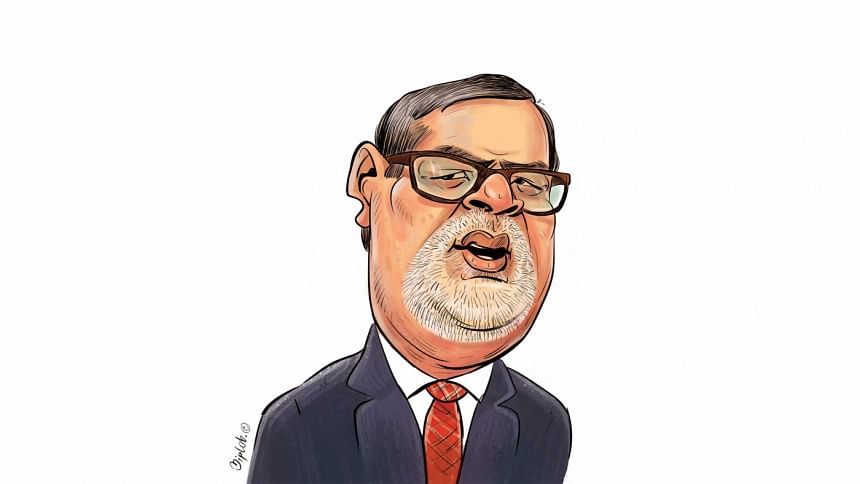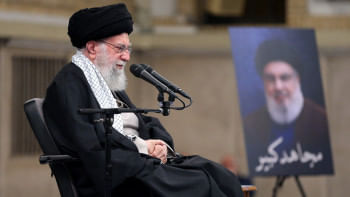The CEC Is Gone, Long Live the CEC!

Let me begin with the story of a thought experiment. I did this experiment with a concept known as perspective-taking. In it, you try to understand things from another person's point of view. You put yourself in their shoes and see their life through their eyes. So, in my little experiment—out of curiosity, and because everyone deserves a little love on Valentine's Day—I put myself in the shoes of our now-retired chief election commissioner.
Here's how I did it: I summoned the energy to wander into his head to understand how he justified doing all that he did since taking up the job. It was a tough sell. But finally, I managed to conjure up five scenarios in which the CEC is not the bad guy, but one whom bad things happen to, thus deserving our pity.
Scenario 1: At the end of his incredibly controversial term at the helm of the most-scrutinised public office in the country, the CEC may think, with the benefit of hindsight, that he was dealt a bad hand. After all, no other CEC had to put up with the third consecutive term of a political government, not least one bent on gaining legitimacy after coming off an uncontested election. He was fated to command a leaky boat. What's remarkable is not that it sank, but that he was on it while it did.
Scenario 2: The CEC can blame his luck for not having a compliant quartet for associates. The blowback he suffered for every mistake he made, for every electoral fraud and violence, for every time he looked the other way while his intervention was sought, would have hurt a lot less if one of his commissioners hadn't blown the trumpet at every opportunity.
Scenario 3: He set a bar below which no CEC can or should aspire to go—something to teach the class of wannabe commissioners. It's a lesson in teaching a lesson, but he is seldom credited for this didactic role.
Scenario 4: The CEC may feel that his real power was vastly overestimated, despite what the constitution says. After all, a constitution is only as effective as the executive branch allows it to be.
Scenario 5: The CEC's sense of humour is criminally underrated. Imagine all the times we mistook his deadpan expression for a lack of humour as he defended the integrity of his office against all evidence. We thought he was being serious, and we chided him for that. Joke's on us.
Or imagine his subtlety when he said, "Often, it is seen that someone who extorts money from hawkers in Gulistan later becomes a leader. One day he can be a parliamentarian too." As I speculated elsewhere: Gulistan here is a metaphor for the entire country. The crook in his little parable represents a cross-section of our leaders who can do anything to reach or retain the high seats of power. Could the CEC reveal more without risking saying more?
***
But perhaps I'm getting ahead of myself. Perhaps he meant none of these, and he has none of the above scenarios playing out in his head. Far from having post-retirement blues, he may feel content. After all, as he suggested in his last media briefing, the success of a CEC should be determined by whether he has conducted all the elections planned, which he did. Merit of the elections be damned.
Incidentally, February 14, 2022 was the last day for our dear departed Election Commission. The stars may not have aligned for this otherwise auspicious day of love and reunion to mark their departure, but it sure brought a certain measure of relief knowing that they are gone. However, them moving out means the next batch of commissioners moving in. The seat of the CEC will not remain vacant for long.
What kind of a CEC will we get next? Will he be cut from the same cloth as the likes of KM Nurul Huda and Kazi Rakibuddin Ahmad, or will he be worthy of his office? Can he do his job even if he wants to? Can the search committee find the most motivated candidates? According to retired Justice Abdul Matin of the Appellate Division of the Supreme Court, who served in several such search committees, the chairman or members of the committee tasked with finding eligible candidates can do very little. Despite their efforts, what happens in the end is that "the Cabinet Division hands over a few envelopes with biographies of some people of the government's choosing. There is no opportunity for scrutinising and selecting anyone from outside." (Prothom Alo, January 23, 2022).
I won't go into a lengthy discussion about this or the performances of the past search committees. We have been complaining about it since this process of EC formation—based on a so-called dialogue with political parties followed by the founding of a search committee—was first adopted in 2013, and nothing happened. The banality of the effort, just as the futility of our whole democratic/electoral exercise, cannot be resolved overnight.
What I find interesting is how the public is reacting to it. After news came out that 322 names of individuals had been submitted for the posts of CEC and four other election commissioners—in other words, over 64 applications for each post—one Facebook user jokingly commented that the commissioner "recruitment" process has become "more competitive than the BCS exam." It's hard to disagree. We're told that at least 100 of the individuals recommended are former bureaucrats. Some of the candidates even submitted their own names to the search committee. Some are reportedly lobbying for the post to the Cabinet Division.
This would be—to rephrase a Stephen Hawking quote—tragic if it weren't funny. What we needed was a sincere effort to have fierce defenders of democracy, not bureaucracy, brought into the Election Commission. What we needed was to create a conducive environment for them to hold free and fair elections by restructuring the electoral process. Instead, what we are getting is a glance into a new generation of candidates inspired by the commissionary zeal of KM Nurul Huda and Co.
You don't need a thought experiment to understand their motive.
Badiuzzaman Bay is an assistant editor at The Daily Star.

 For all latest news, follow The Daily Star's Google News channel.
For all latest news, follow The Daily Star's Google News channel. 



Comments